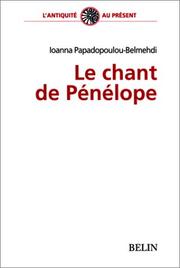| Listing 1 - 2 of 2 |
Sort by
|

ISSN: 12575887 ISBN: 270111764X 9782701117645 Year: 1994 Publisher: Paris : Belin,
Abstract | Keywords | Export | Availability | Bookmark
 Loading...
Loading...Choose an application
- Reference Manager
- EndNote
- RefWorks (Direct export to RefWorks)
À travers le personnage de Pénélope et son tissage toujours repris, se dessine en creux une autre Odyssée : celle de l'attente d'Ulysse, d'une mémoire féminine qui arrête la durée pour donner au héros le temps de rejoindre Ithaque. Pariant sur la cohérence d'ensemble de l'épopée, Ioanna Papadopoulou-Belmehdi voit dans la toile de Pénélope "le code d'accès à la structure sinueuse de la poétique odysséenne" et sait alors entendre, dans la répétition de l'histoire de Pénélope, éclatée en plusieurs versions qui ne consonnent pas, une mise en dialogue au sein même du texte de l'Odyssée. Alors se révèle l'intériorité de ce "personnage-penseur" qui, pour peu qu'on prenne au sérieux son détissage, n'est ni incolore ni conforme, mais invente l'analyse pour des générations de philosophes.
Penelope (Greek mythology) --- Pénélope (Mythologie grecque) --- Homer. --- Pénélope (Mythologie grecque) --- Penelope --- Epic poetry, Greek --- Women and literature --- History and criticism --- Homer --- Characters --- Epic poetry, Greek - History and criticism --- Women and literature - Greece --- Homer - Characters - Penelope --- Penelope - (Greek mythological character) in literature --- Homer. - Odyssey
Book
ISBN: 0691067961 1322018413 9781400861873 140086187X 9780691067964 0691607370 9780691607375 Year: 1991 Publisher: Princeton, New Jersey
Abstract | Keywords | Export | Availability | Bookmark
 Loading...
Loading...Choose an application
- Reference Manager
- EndNote
- RefWorks (Direct export to RefWorks)
Noted for her contradictory words and actions, Penelope has been a problematic character for critics of the Odyssey, many of whom turn to psychological explanations to account for her behavior. In a fresh approach to the problem, Marylin Katz links Penelope closely with the strategies that govern the overall design of the narrative. By examining its apparent inconsistencies and its deferral of truth and closure, she shows how Penelope represents the indeterminacy that is characteristic of the narrative as a whole. Katz argues that the controlling narrative device of the poem is the paradigm of Agamemnon's fateful return from the Trojan War, narrated in the opening lines of the Odyssey. This story operates not only as a point of reference for Odysseus' homecoming but also as an alternative plot, and the danger that Penelope will betray Odysseus as Clytemnestra did Agamemnon is kept alive throughout the first half of the poem. Once Odysseus reaches Ithaca, however, the paradigm of Helen's faithlessness substitutes for that of Clytemnestra. The narrative structure of the Odyssey is thus based upon an intratextual revision of its own paradigm, through which the surface meaning of Penelope's words and actions is undermined though never openly discredited.Originally published in 1991.The Princeton Legacy Library uses the latest print-on-demand technology to again make available previously out-of-print books from the distinguished backlist of Princeton University Press. These editions preserve the original texts of these important books while presenting them in durable paperback and hardcover editions. The goal of the Princeton Legacy Library is to vastly increase access to the rich scholarly heritage found in the thousands of books published by Princeton University Press since its founding in 1905.
Epic poetry, Greek --- Women and literature --- Languages & Literatures --- Greek & Latin Languages & Literatures --- Literature --- Greek epic poetry --- Epic poetry, Classical --- Greek poetry --- Penelope --- In literature --- Penelope (Greek mythology) in literature --- History and criticism --- Homer. --- Homerus --- Homer --- Hóiméar --- Hūmīrūs --- Homeros --- Gomer --- Omir --- Omer --- Omero --- Ho-ma --- Homa --- Homérosz --- האמער --- הומירוס --- הומר --- הומרוס --- هومر --- هوميروس --- 荷马 --- Ὅμηρος --- Гамэр --- Hamėr --- Омир --- Homère --- Homero --- 호메로스 --- Homerosŭ --- Homērs --- Homeras --- Хомер --- ホメーロス --- ホメロス --- Гомер --- Homeri --- Hema --- Pseudo-Homer --- Pseudo Omero --- Homerus. --- Characters --- Penelope. --- Penelope (Greek mythology) in literature. --- History and criticism. --- Epic poetry, Greek -- History and criticism. --- Homer -- Characters -- Penelope. --- Homer. -- Odyssey. --- Women and literature -- Greece.
| Listing 1 - 2 of 2 |
Sort by
|

 Search
Search Feedback
Feedback About
About Help
Help News
News